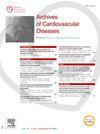Health-related quality of life in pediatric inherited cardiac disease: The QUALIMYORYTHM multicenter cross-sectional controlled study
IF 2.2
3区 医学
Q2 CARDIAC & CARDIOVASCULAR SYSTEMS
引用次数: 0
Abstract
Introduction
Medical advances in the management of children with inherited cardiac disease have shifted the focus from mortality to life-long morbidity, with a stronger attention on patient-reported outcomes. Health-related quality of life (HRQoL) has been increasingly used as a primary outcome in cross-sectional or randomized controlled trials in CHD, however no consistent controlled data is available in children with inherited cardiac arrhythmia or cardiomyopathy. The QUALIMYORYTHM trial aimed to evaluate HRQoL in cohort of children with inherited cardiac disease, in comparison with healthy controls, and to determine their predictors of HRQoL.
Method
Children aged–6-17 years, diagnosed with inherited cardiac arrhythmia (long QT syndrome, Brugada syndrome, catecholaminergic polymorphic ventricular tachycardia) or inherited cardiomyopathy (hypertrophic, dilated, restrictive, or arrhythmogenic right ventricular cardiomyopathy), and healthy age- and gender-matched controls were prospectively recruited in 7 pediatric tertiary care centers in France. HRQoL was assessed using the self and proxy PedsQL questionnaires. Clinical data, physical activity (accelerometer) and cardiorespiratory fitness (cardiopulmonary exercise testing) were assessed (NCT04712136).
Results
A total of 210 children were included (103 patients, mean age 12.7 ± 3.13 years and 107 controls). HRQoL in children with inherited cardiac disease was good, overall, but remained significantly lower than healthy controls in self-reported (78.8 ± 13.3 vs. 82.1 ± 9.6, P = 0.04) and proxy-reported (75.1 ± 15.7 vs. 78.9 ± 15.2, P = 0.05) total scores. HRQoL was not significantly different in disease subgroups. In multivariate analysis, predictors of better HRQoL included higher resting heart rate, postnatal diagnosis, better cardiopulmonary fitness, lower controlled motivation score, and normal school status.
Conclusion
Currently, HRQoL in children with inherited cardiac disease is good, but significantly lower than healthy peers, and influenced by clinical, functional, and sociodemographic factors. These findings highlight the need for multidisciplinary interventions focusing on physical fitness, psychosocial support, and educational stability to improve their long-term patient-reported outcomes.
儿童遗传性心脏病的健康相关生活质量:QUALIMYORYTHM多中心横断面对照研究
儿童遗传性心脏病治疗的医学进展已将焦点从死亡率转移到终身发病率,更加关注患者报告的结果。健康相关生活质量(HRQoL)越来越多地被用作冠心病横断面或随机对照试验的主要终点,但在遗传性心律失常或心肌病患儿中没有一致的对照数据。QUALIMYORYTHM试验旨在评估遗传性心脏病儿童队列的HRQoL,并与健康对照组进行比较,并确定其HRQoL的预测因子。方法在法国7个儿科三级保健中心前瞻性招募年龄在6-17岁、诊断为遗传性心律失常(长QT综合征、Brugada综合征、儿茶酚胺能多型室性心动过速)或遗传性心肌病(肥厚性、扩张性、限制性或致心律失常性右室心肌病)的儿童,以及年龄和性别匹配的健康对照。HRQoL采用自我和代理PedsQL问卷进行评估。评估临床数据、体力活动(加速度计)和心肺健康(心肺运动试验)(NCT04712136)。结果共纳入210例患儿(103例,平均年龄12.7±3.13岁,对照组107例)。遗传性心脏病患儿的HRQoL总体上较好,但自述总分(78.8±13.3比82.1±9.6,P = 0.04)和代理报告总分(75.1±15.7比78.9±15.2,P = 0.05)仍显著低于健康对照组。不同疾病亚组间HRQoL差异无统计学意义。在多变量分析中,较好的HRQoL的预测因子包括较高的静息心率、产后诊断、较好的心肺适能、较低的控制动机评分和正常的学校状况。结论目前,遗传性心脏病患儿的HRQoL较好,但明显低于健康同龄人,并受临床、功能和社会人口因素的影响。这些发现强调了多学科干预的必要性,重点是身体健康、社会心理支持和教育稳定性,以改善患者报告的长期结果。
本文章由计算机程序翻译,如有差异,请以英文原文为准。
求助全文
约1分钟内获得全文
求助全文
来源期刊

Archives of Cardiovascular Diseases
医学-心血管系统
CiteScore
4.40
自引率
6.70%
发文量
87
审稿时长
34 days
期刊介绍:
The Journal publishes original peer-reviewed clinical and research articles, epidemiological studies, new methodological clinical approaches, review articles and editorials. Topics covered include coronary artery and valve diseases, interventional and pediatric cardiology, cardiovascular surgery, cardiomyopathy and heart failure, arrhythmias and stimulation, cardiovascular imaging, vascular medicine and hypertension, epidemiology and risk factors, and large multicenter studies. Archives of Cardiovascular Diseases also publishes abstracts of papers presented at the annual sessions of the Journées Européennes de la Société Française de Cardiologie and the guidelines edited by the French Society of Cardiology.
 求助内容:
求助内容: 应助结果提醒方式:
应助结果提醒方式:


